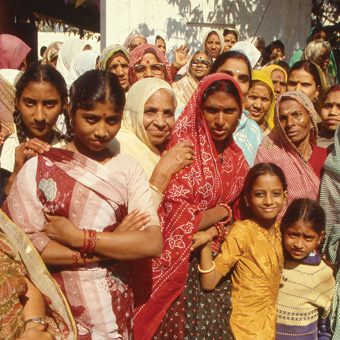India and the United States may be on opposite ends of the belief spectrum, but both cultures must make a case for God that includes everyone.
In an age of atheism, in which it is considered rude in many circles to even bring up religion, I’ve got a problem. Remember that wonderful old Joni Mitchell song from her album Blue? It’s called “A Case of You.”
“Oh, I could drink a case of you, darling,
And I would still be on my feet,
Oh I would still be on my feet.”
I like the double-edgedness of the song. A case of God, something concrete and real to consume (the song continues: “Oh you’re in my blood, you’re like holy wine, you taste so bitter, and so sweet . . .”), but also case as a condition.
That’s God for me. And my problem is that I think I have a case of God, like a case of homesickness or longing—a constant awareness that there is more to everything than meets the eye, a knowledge that without God’s presence, something fundamental is missing; that unless I view my life through the lens of God, I miss the point. Our hearts are restless till they rest in thee.
Or a case of God could be a container with its contents. Not just the box, not just the contents. The whole picture. The complete and fluid reality of one who says, “I am who am.” A case of God. The one you drink down in its entirety and still remain standing. Indeed, the only thing which allows us to stand at all—the ground of our being.
Which leads seamlessly to the charge we are given in the gospels: Go and make disciples of all nations—essentially, make a case for God. I have to admit to some difficulty with this task, some fundamental feeling of presumption, of being on the ground of our being and having forgotten to take off my shoes.
When the Alpha and the Omega, the ground of our being, is how we speak of God, how do we begin to make a case for him?
Can we make a case for breath when singing? Or for food when cooking? For seeds when planting, or fire when burning? Can we make a case for love when making love? The sine qua non of making love is love. Sex is possible for any animal, but you cannot make love unless you do, in fact, love. So what case is there to be made? Why would you bother? And if you did, would it convince anyone?
It is like that with God, I think. Is it preferable, or wise, or even possible to argue or debate someone into belief?
This is a secular age, no doubt. Whereas faith in God was once (say, up until a few hundred years ago) a given, part of the air we breathed and the soil we planted, for most Americans and Europeans today this is simply not true. Indeed, unbelief is now so widespread and diffuse that we hardly notice it.
The values of an atheistic society communicate themselves to us in so many thousands of small and subtle ways we cannot expect to always be on guard against them, even if we want to. The legal ban on state-sponsored religious displays at Christmas is just the tip of a very absurd iceberg. How we think about babies and marriage, how we look after our parents, what decisions we make when a person is critically ill, how we choose a career, how we think about sexual relations—all have been shaped and re-drawn according to new standards, standards that make reference to science, logic, and reason, not religious beliefs.
Unbelief is now the fabric we wear—like an old sweater, it is so comfortable and familiar we only notice we have it on when, unexpectedly, we find ourselves at a party where everyone else is all dressed up. Think of the relatives—all lapsed Catholics—turning up solemnly at Grandma’s funeral, suitably clad in the black outfits they virtuously raced out to buy, but with no idea when to kneel or stand or what the responses to the prayers are. A priest friend of mine told me of a funeral he officiated at for a pious mother of eight where, as he walked down the aisle after the coffin, he saw, to his horror and dismay, a consecrated host lying un-remarked in the pew, left there casually by one of the uncomprehending grandchildren.
I live in India, where belief is still the prevailing ethos and where acknowledgment of higher powers is so accepted it is built into daily rituals and observances and practiced almost unconsciously. There is a temple, for example, on the highway between Dehradun, where I live, and Delhi. The god it honors is considered a patron for travelers, and no driver will pass by without pausing to venerate it with the Hindu version of the sign of the cross.
There is a ceremony for offering the first transaction of the day to God, which shopkeepers and roadside vendors practice without fail for fear of jinxing the entire day’s sales. Our house was recently painted by a team of Muslim workers who would calmly and without fuss stop what they were doing several times during the day to unroll their prayer rugs, turn toward Mecca, and kneel down to pray.
The point is that here in India, God is everywhere. And visible. Nobody makes a case for God because there is simply no need to do so.
Indeed, the effort and the need is in the reverse. People of wisdom and grace are constantly being called upon here to unmake the case for God, to insist that God does not prefer Hindus to Muslims or Muslims to Christians or Christians to anybody else in the world.
People of depth and conviction, many of whom believe fervently in God themselves, find themselves forced—with depressing frequency—to demand that their fellow citizens rise above their intensity and righteousness and religious belief and acknowledge that God is larger than all of us; that God does not distinguish between faiths or among churches, temples, and mosques; that God is love and that violence in his name is blasphemy and a desecration.
It’s a hard road, and a long one, and it is often traveled without success.
Belief is perhaps the single most divisive force in India today. The righteousness of religious conviction is almost incredibly easy to exploit here, and political agendas which have nothing to do with faith or religion have been successfully advanced through sinister manipulation of coincidental events.
Where belief is concerned, facts are irrelevant. Consider the ease with which anti-Muslim hysteria has been whipped up in the United States in the 10 years since September 11, and how the beliefs and practices of an ancient and venerable faith have been distorted—beliefs and practices no less precious to Muslims than ours are to us. Jihad, for example, is revered in Islam in the same way martyrdom is in Christianity.
Only the holiest, purest souls are called to make such an extreme sacrifice, and even then, it is only considered jihad if the cause is equally righteous.
How would we feel if Joan of Arc or Oscar Romero were painted as crazed fanatics, deluded and brainwashed at best, evil and demonic at worst? How dare we dismiss the nuanced and strongly held beliefs of another religion as insanity or evidence of brainwashing or criminally subversive activity?
We dare because we are encouraged to do so. During the Inquisition, not only was Christianity enforced, but only one kind of Christianity would do. In Nazi Germany the same logic applied. The Sunnis and the Shiites, the Arabs and the Jews, the Hindus and the Muslims—do we need more examples of the divisiveness of faith, the deep and enduring chasms just waiting for us to fall into?
Belief in God is a fundamental human condition. Our hearts are restless until they rest in him. But we have come to the end of the road for making a case for God, at least in the traditional sense. The age of evangelization and the propagation of the faith is over. Holy wars, crusades, fatwas, and edicts—let them all die a natural death. A God who needs a case to be made on his behalf is no God at all.
God is and God is here; the signs are all around us.
For me, the case for God is made by the work of those who love him, a love that can only be demonstrated by love for his creation: his people, animals, planet. Look at the free hospitals and schools, the prison ministries, the public libraries. See the food banks, the land trusts, the soup kitchens, the bird sanctuaries. Listen to the activists who speak of social justice, disarmament, conservation, and an end to hunger. Some identify God as their inspiration openly, while others do not. Does it matter? Is God any less present for not being named?
By their works ye shall know them, and by extension, know him.
Father Michael Himes of Boston College, my new favorite theologian, says that God is relationship. God is what happens when one person reaches out to another in love. The work of God is the work of mercy, love, service. No greater case can be made for his presence in our lives and in the world than by serving his people. No greater proof of our belief in his existence can be offered.
Indeed, in Matthew 25:31-46 Jesus spells it out for us in words too stark to be misinterpreted. “Whatsoever you do to the least of my brothers and sisters, that you do unto me.” Not a squeak about which church you were a member of or to which God you prayed. Not a mention of the sacraments you received on how regular a basis or the number of people you converted. Nothing about how much money you donated to the temple or the synagogue or the church or the mosque. All that matters, all that we will be judged upon, is how we treated other people.
This is not an argument against religion or against the need so many of us have—and I am one of them—for some structure for our belief. It is rather a recognition that this is our need, not God’s. But in recognizing that, along with our need to make his case, proclaim our faith, and share what we believe, let us remember Ralph Waldo Emerson’s astute observation: “What you do speaks so loudly, I cannot hear what you say.”
A case for God could also be a container: a case and its contents. What might it hold to honor him whose beauty is past change?
I’d like to give God a case of daffodil bulbs, Beethoven sonatas and quartets on CD, fine wine, cheese, apples, chocolate truffles—or cases and cases—full, pressed down, and overflowing of every good thing in thanksgiving, in praise, in celebration.
I’d like to give God a case of all the things he doesn’t need but which we want to give him anyway—like all of our ancestors from so many different faiths have given him down through the ages: the firstfruits, the perfect flowers, the soaring music, the exquisite joy, and the shimmering beauty that is ours because God is, now and forever, by whatever name, in whatever form, by whatever light, in whatever language, and from whatever angle he chooses to reveal himself. Praise him.
This article appeared in the July 2011 issue of U.S. Catholic (Vol. 76, No. 7, pages 33-35).













Add comment